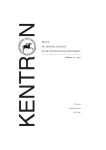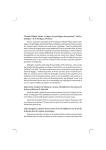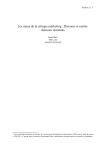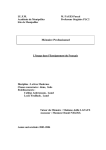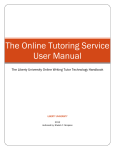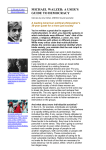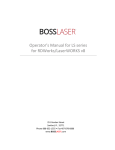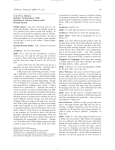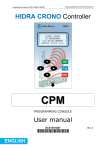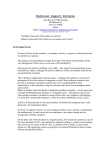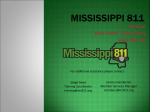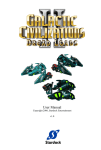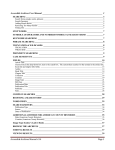Download Colonization to Civil War: Major Themes in American History, 1600
Transcript
The University of Southern Mississippi Department of History History 201 Spring 2007 2:25—3:40PM T, Th. Colonization to Civil War: Major Themes in American History, 1600-1865 “The good historian is like the giant in the fairy tale. He knows that whenever he catches the scent of human flesh, there his quarry lies.” --Marc Bloch, The Historian’s Craft, 1941 Dr. Kyle F. Zelner Office: 466 LAB Office Phone: 601-266-6196 Email: [email protected] Web Site: http://ocean.otr.usm.edu/~w535683/Index.html Office Hours: Mondays, 2-4PM; Tuesdays, 4-5PM; & by appointment Statement of Purpose: This course will investigate the major themes and events in the history of the region that eventually became the United States. We will examine and explore the people who lived and worked in this expanse from the time just preceding its "discovery" by seafaring Europeans to the establishment of colonies, the war for independence from England, the beginnings of a new government, and the long sectional conflict that culminated in a great civil war. This long period (over 350 years) is one of the most important and exciting times in our history. While many may wonder what use it is to study such an old and (some would say) irrelevant time, we should remember that many of the most basic institutions and cultural practices we observe today were formulated during this notable period. This course will also provide you the skills and background to embark on further study of American history. Course Goals: •To explore the development of American political, economic, cultural, and social institutions. •To examine and recognize the major impact that socially and ethnically diverse groups had on the formation of the American nation. •To develop the students’ intellectual skills to analyze and interpret history. This development will enable the student to excel in a number of areas including reading comprehension, persuasive writing, and critical thinking. Dr. Zelner, HIS 201, Spring 2007 1 Mechanics of the Course: For the majority of class time, the instructor will lecture on the course material. Lectures WILL NOT NECESSARILY come from or follow the textbook’s track—your reading of texts and lectures are independent and you will have to blend them in order to understand our topic. Audiovisual materials may be used during certain classes to stimulate understanding and discussion. The schedule of topics and the reading assigned to complement the lectures follows below. It is important that you have the reading done before class each week to be able to follow the lectures more precisely and it is IMPERATIVE that you have the reading done by Thursdays since the class will feature reading quizzes on most Thursdays, along with some aspect of group discussion. Active and thoughtful participation in the discussions is a requirement of the course. Read the class schedule below, consult your USM email account, and listen for class announcements for changes in this general format. Required Books to Purchase (available at the Barnes & Noble on campus): Nash, Gary, et al. The American People: Creating a Nation and a Society. Vol. 1 to 1877. Brief 5th ed. New York: Pearson Longman, 2006. Includes a license to use the My History Lab web site (REQUIRED). Rampolla, Mary Lynn. A Pocket Guide to Writing in History. 5th ed. (Boston: Bedford, 2006). Assignments, Attendance, & Grading: The first assignment is the careful reading of this syllabus. Attentive and informed reading of all class readings is necessary for the satisfactory completion of the course. Attendance at ALL classes is MANDATORY. Attendance will be taken at most class meetings and unexcused absences will hurt your final grade. Excessive unexcused absences (i.e. more than three) will result in the loss of a letter grade or even failure for the course. Absences are excused in the event of a true emergency (sleeping in or feeling “under the weather” DO NOT qualify) or with the prior approval of the instructor. In all cases, I require written documentation from the appropriate authorities (dean’s office, athletic coaches, doctors, etc.). Please Note: If you stop attending class, but do not withdraw from the course at the Registrar’s Office, the instructor will issue a failing grade (F) for the course. The omission of any class requirement will result in automatic failure for the course— in other words; you must turn in every major assignment in order to pass the course. Each week, in addition to the readings from the textbook, you will read a number of primary source documents on the My History Lab web site—which comes packaged with your textbook. Each Thursday, at the beginning of class, there will be a short quiz on the week’s primary document readings and then a chance to discuss them. The quizzes will be worth 15% of your final grade. Dr. Zelner, HIS 201, Spring 2007 2 There will be two papers in this class. Details on the paper topics will be handed out well in advance of the due date to ensure students start working on papers early. History papers MUST be argumentative (have a strong thesis), conform to all rules of grammar and spelling, and document their sources. Students are strongly encouraged to read and apply the lessons in the required text A Pocket Guide to Writing in History by Mary Rampolla in order to ensure success on papers. More information on papers (mechanics, etc.) is listed below in “Course Policies.” The first paper for the class will have you read a biography of a historical figure from the period (go to the library for help finding biographies) and write a paper based on that work. Students must get their book approved by the instructor before they write the paper (see the approval sheet for details)—the deadline for approval is February 1st. This assigned paper will be worth 15% of your final grade, be 4-5 pages in length, and will be due February 22nd at the beginning of class. The second paper for the course is based on primary documents from the My History lab web site, exploring a single event or theme in American History. For instance, you might want to write on the Salem Witch Trials and pick all of the relevant materials from the MyHistoryLab web site to act as the source material for crafting a thesis for a paper. Or you might look at the coming of the America Revolution, the place of women in Early American history, or any of a whole range of topics. Students will write a paper proposal which will name their topic, which documents from My History Lab they will use to write the paper, and a possible thesis. The deadline for the paper proposal is March 20th. Students are strongly encouraged to talk to the professor before writing the proposal—as the instructor must approve the paper topic. Students who do not turn in a proposal will not be able to write a paper and will not pass the class. The paper itself will be 4-5 pages long, will be worth 15% of your final grade, and will be due April 17th at the beginning of class. There will be three examinations during the course, two midterm exams (February 27th and March 29 th) and a final exam (Friday, May 11th, from 11AM to 1:30PM). Examinations will be a mixture of identification and essay questions. The midterm exams will each count as 15% of your final grade, while the final exam will be worth 25%. If you are unable to take an exam, be sure to discuss it with the instructor in advance. If you are ill on the day of an exam, be sure to call and leave your phone number so I can reach you. Documentation (such as a doctor’s note) must be produced before a student may take a “make-up” exam. If you have any questions about this policy or the instructor’s policy on receiving an Incomplete (I) grade for the course, please see the instructor. Grading Breakdown: Quizzes Biography Paper (1st) Document Paper (2nd) 1st Midterm Exam 2nd Midterm Exam Final Exam Total 15% 15% 15% 15% 15% 25% 100% 150 Points 150 Points 150 Points 150 Points 150 Points 250 Points 1000 Points Class Grading Scale: A=1000-900 points; B=899-800 points; C=799-700 points; D=699-600 points; F=below 600 points. Dr. Zelner, HIS 201, Spring 2007 3 **As strict as this scale seems, improvement in grades over the semester MAY be taken into account when assigning the final grade. This is a learning process and if you can demonstrate that you have improved your skills by posting better grades at the end of the course, you will be rewarded. A Note about Office Hours: I will hold office hours (see page 1) for any interested students at posted times and will be happy to arrange a different time for you to come in and see me if those times do not fit into your schedule. If for some reason I can not meet during my office hours, I will try to announce it in class and I will post it on my office door. This is time I have set aside for you to come in and talk about your questions or comments about the class, history, writing, the college, or whatever (including “Battlestar Galactica”). It is a great time to come in and discuss paper topics or questions. If you're interested in majoring in history or thinking of someday going to grad school, come in and chat. It is unfortunate that more students don't take advantage of faculty office hours--we're not just available in the classroom. Course Policies: 1. Class Climate: This course is designed to give you a chance to explore an area of academic interest through lectures, intensive reading, writing, and discussion. In order for discussions to be productive, all students need to feel comfortable participating. We will create and maintain an atmosphere of mutual respect in which everyone’s ideas can be heard. 2. USM Email: All students should check their USM email regularly—you can set it to forward to your main email (yahoo, hotmail, etc.) account if you desire, but be sure to check it in some fashion. Students who do not set up their accounts or respond to USM email will loss participation points and suffer a lower grade. I will use these online resources to post assignments, keep you up-to-date on class activities, and possibly even give you portions of your exams. 3. Pagers and Cell Phones: All pagers and cell phones must be turned to silent mode (vibrate) or turned off when in class! If you must take or make an emergency call, leave the classroom (and reenter) quietly so you will not disturb others. All cell phones must be off and put away during exams—NO EXCEPTIONS! 4. Support and Documentation: Support your paper arguments with specific textual references— in other words, you must use footnotes for all papers. Follow Chicago Manual of Style format and documentation, which is also known as the Turabian style. For help and examples, see the USM Libraries’ web page at http://www.lib.usm.edu/research/guides/turabian.html or the style manual recommended for the class: Rampolla, A Pocket Guide to Writing in History, for information. 5. Manuscript Preparation: All papers should be computer-generated (12pt font, Times New Roman) and should be double-spaced with one-inch margins. Papers should always be handed in with the pages numbered and stapled together. Proofread carefully. Clearly place your name, the Dr. Zelner, HIS 201, Spring 2007 4 course and instructor, a description of the paper, and date of each assignment in the upper right hand corner of the first page.* *Sample heading for papers: Student Name History 201—Dr. Zelner Paper One September 19, 2006 6. Copies of Papers: It is your responsibility to keep a copy of each paper that you submit. In the unlikely event that I misplace the paper, you should be able to produce your copy that same day. Students unable to produce the requested copy will fail the assignment. 7. Delivery of Papers: Students are required to hand in TWO COPIES of each paper: one hard printed copy, which must be handed in at the place and time indicated on the course schedule and one electronic copy, which must be submitted to http://www.turnitin.com under the correct class and assignment on the same day. More information on Turnitin.com is below. 8. Late Papers: Papers submitted between one and four days after the due date will be penalized one full letter grade (Example: a B- paper would become a C-). Papers submitted five to seven days after the due date will be penalized two full letter grades (Example: a B- paper becomes a D-). Papers submitted more than one week after the due date WILL NOT BE ACCEPTED (NOTE— ALL CLASS ASSIGNMENTS MUST BE TURNED IN AND ACCEPTED TO PASS THE COURSE). Extensions of a paper due date will be granted only in the event of a documented medical, athletic, academic, or personal emergency and only in advance of the paper due date. Decisions on the validity of the documentation are within the sole purview of the instructor. 9. Academic Dishonesty: Scholastic dishonesty will not be condoned under any circumstance. See the current Undergraduate Bulletin for a good definition of such behavior. Cheating on an exam or demonstrated plagiarism on a paper will automatically lead to a grade of “F” for the course and can result in dismissal from the university. The instructor reserves the right to use electronic resources, such as Turnitin.com, to detect plagiarism. If you have questions or concerns about this policy— please see the instructor during office hours. 10. Students with Disabilities: If you have any disabilities that might affect your performance in this class, please let me know. If a student has a disability that qualifies under the Americans with Disabilities Act (ADA) and requires accommodations, he/she should contact the Office for Disability Accommodations (ODA) for information on appropriate policies and procedures. Disabilities Covered by ADA may include learning, psychiatric, physical disabilities, or chronic health disorders. Students can contact ODA if they are not certain whether a medical condition/disability qualifies. Mailing address: 118 College Drive # 8586, Hattiesburg, MS 39406-0001; Telephone: (601) 266-5024; TTY: (601) 266-6837; Fax: (601) 266-6035 or at: http://www.ids.usm.edu/ODA/default.asp Dr. Zelner, HIS 201, Spring 2007 5 11. Improving Writing: While I am always available to discuss your ideas and look over drafts (well) before paper due dates, I also encourage you to use the following resource: The History Writing Lab; Room 464, Liberal Arts Building (LAB); phone: 601-266-4086; email: [email protected]. Web: http://www.usm.edu/history/writinglab.html History students at USM have a special opportunity to get help writing history papers, studying for history exams, and/or doing historical research. The History Department sponsors a History Writing Lab (HWL). The HWL is staffed by advanced graduate students who can assist at any stage of studying or writing, from generating ideas to polishing final drafts, and with any type of history writing project, from book reviews to research papers to preparing for exams. Be aware, the HWL does not provide an editing service where the consultants only correct grammatical errors and typos—the goal of every consultation is to help students become better writers, a process that happens gradually and that occurs through the active participation of students in consultations. If you need some help or guidance, call or email to make an appointment or just stop by for a free, friendly consultation. 12. Syllabus: This syllabus is a mutual contract between the professor and student and the student and professor. It will not be altered lightly, however if circumstances make it necessary, the changes will be made as far in advance as is possible and in writing. Dr. Zelner, HIS 201, Spring 2007 6 Plagiarism Detection Service What is Turnitin? USM has a subscription to the Web-based plagiarism detection software Turnitin. Colleges and universities around the world have found that using Turnitin helps stop and prevent plagiarism of Internet material. Here's how it works: -- Students (or their instructors) submit electronic copies of assignments to the Web site http://www.turnitin.com. -- Turnitin compares the student's paper to a range of other sources, including a large database of other students' writing, the Web in general, and many common full-text journals that are available through USM Libraries' online databases. -- Turnitin then generates an Originality Report for each paper submitted, which shows the percentage of text within that paper that matches text taken from one or more other sources. Using the reports, instructors can compare the text of the student's paper side-by-side with the secondary source. When a substantial amount of text in a student paper matches texts in one or more other sources, this may be an indicator of plagiarism. The main purpose of Turnitin is: -- to ensure that students do their own work -- to keep students from relying too heavily on secondary sources. --to deter intentional or unintentional plagiarism in the future - either by making students aware that they are submitting electronic copies of their work to be checked, or by providing them with an opportunity to learn about what constitutes plagiarism. Turnitin is not a surefire way to detect plagiarism: it simply points out where text in a submitted paper closely resembles text from other sources. Once Turnitin has identified any discrepancies, it is up to the instructor to determine whether the student has properly cited the source. Class Information for History 201—Sec.01 Spring 2007, Dr. Zelner: Class ID Number: 1777453_ Class Password (case sensitive): _history___ You will need this information to log-on and create an account on the Turnitin web site, which is required of all students in the class by Thursday, January 25th. If you need help, surf over to: http://www.lib.usm.edu/research/plag/turnitin/index.php Dr. Zelner, HIS 201, Spring 2007 7 Log-on Information: This quickstart will help you get started with Turnitin and will walk you through the steps for submitting your first paper. To begin, you need to first register with Turnitin and create a user profile. ! If you have received an e-mail from Turnitin with a temporary password, a user profile has already been created for you. To get started, log in to Turnitin with your e-mail address and password and proceed to Step 2 in this quickstart. Step 1 To register and create a user profile, go to www.turnitin.com and click on the create a user profile at the top of the homepage 1. 1 Click to register and create your user profile The new user wizard will open and walk you through the profile creation process. To create a profile, you must have a class ID and an enrollment password (Class ID Number: 1777453_ Class Password (case sensitive): _ history__). You can get this information from your instructor. Once you finish creating your profile, you will be logged in to Turnitin. Step 2 Your class will show up on your homepage. Click on the name of your class to open your class portfolio 2. 2 Click on the name of your class to open your portfolio Step 3 Your class portfolio shows the assignments your instructor has created and your submissions to the class. To submit a paper, click the submit button next to the paper’s assignment 3. Dr. Zelner, HIS 201, Spring 2007 8 3 Click the submit icon to upload your paper Step 4 The paper submission page will open. Enter a title for your paper. To select a paper for submission, click the browse button and locate the paper on your computer. We accept submissions in these formats:• MS Word, WordPerfect, RTF, PDF, PostScript, HTML, and plain text (.txt). After entering a title for your paper and selecting a file, click submit to upload your paper 4. 4 Once you have located your paper and entered a title, click submit If your paper is in a format that we do not accept, you can submit it by cut and paste. To submit a paper this way, select cut & paste using the pulldown at the top of the form 5. 5 Select cut & paste with the pulldown to submit a paper in a file format we do not accept To submit a paper by cut and paste, copy the text of your paper from a word processing program and then paste it into the text box in the submission form. If you submit your paper using the cut and paste method, you can skip the next step. Step 5 Dr. Zelner, HIS 201, Spring 2007 9 The paper you chose to submit will be shown on the next page. Look over all the information and make sure that it is correct. To confirm the submission, click the yes, submit button 6. 6 Make sure you selected the correct paper; click “yes, submit” to finalize your submission Step 6 After you confirm your submission, a digital receipt will be shown. This receipt will be e-mailed to you. To return to your portfolio and view your submission, click the portfolio button 7. 7 Click the portfolio icon to return to your portfolio and view your submission ! By default, students cannot see their own Originality Reports. If you need further assistance with Turnitin or would like to learn about the advanced features our system offers, please download the student user manual, which is available at: http://www.turnitin.com/static/training_support/index.html. Dr. Zelner, HIS 201, Spring 2007 10 Course Schedule: Week 1—America Before and At Contact Reading Assignment: Nash, Chap. 1, Rampolla, pgs. 1-118. Tuesday, Jan. 16—Course Introduction Thursday, Jan. 18—Lecture & General Discussion Week 2—English Colonial Beginnings Reading Assignment: Nash, Chap. 2 and MyHistoryLab Documents-Chap. 2 “Thomas Harriot, The Algonquian Peoples of the Atlantic Coast (1588)” and “Letter by Capt. John Smith to Queen Anne (1617)” Tuesday, Jan. 23—Lecture & General Discussion Thursday, Jan. 25— Primary Source Quiz, Lecture, & General Discussion ALL STUDENTS TO REGISTER WITH WWW.TURNITIN.COM BY THIS DATE Week 3—Colonial Case Study #1—The Chesapeake Reading Assignment: Nash, Chap. 3 and MyHistoryLab Documents-Chap. 2 “Of the Servants and Slaves in Virginia (1705),” and Chap. 3 “Richard Frethorne, Letter to His Parents (1623),” and “Wessell Webling, His Indenture (1622)” Monday, Jan. 29--Last day to drop and receive 100% refund Tuesday, Jan. 30—Lecture & General Discussion Thursday, Feb. 1— Primary Source Quiz, Lecture, & General Discussion *BOOK FOR PAPER ONE MUST BE APPROVED BY THE INSTRUCTOR BY THIS DATE—SEE ASSIGNMENT FOR DETAILS Week 4--Colonial Case Study #2—Puritan New England Reading Assignment: Nash, Chap. 4 and MyHistoryLab Documents-Chap. 3 “Conversion Narrative of “Old Goodwife Cutter” (1630s)” and “The Examination and Confession of Ann Foster at Salem Village (1692)” Tuesday, Feb. 6—Lecture & General Discussion Thursday, Feb. 8— Primary Source Quiz, Lecture, & General Discussion Dr. Zelner, HIS 201, Spring 2007 11 Week 5—The Road to Revolution Reading Assignment: Nash, Chap 5 and MyHistoryLab Documents-Chap. 5 “Benjamin Franklin, Testimony Against the Stamp Act (1766),” “John Dickinson, from Letters from a Farmer in Pennsylvania (1768),” and “The Virginia Nonimportation Resolutions (1769)” Tuesday, Feb. 13—Lecture & General Discussion Thursday, Feb. 15—Primary Source Quiz, Lecture, & General Discussion Week 6—The War for Independence Reading Assignment: Nash, Chap 6 and MyHistoryLab Documents-Chap. 6 "Common Sense" by Thomas Paine,” “Letter from a Revolutionary War Soldier (1776),” and “Thomas Jefferson, “Original Rough Draught” of the Declaration of Independence (1776)” Tuesday, Feb. 20— No Class—Mardi Gras Break! Thursday, Feb. 22— Primary Source Quiz, Lecture, & General Discussion *PAPER ONE (BIOGRAPHY) DUE AT CLASS START—SEE ASSIGNMENT FOR DETAILS Week 7—A New Nation Reading Assignment: Nash, Chap. 7 and MyHistoryLab Documents-Chap. 7 “The United States Constitution and the Bill of Rights” and “Patrick Henry Speaks Against Ratification of the Constitution (1788)” Tuesday, Feb. 27—*MID-TERM EXAM #1 Wednesday, Feb. 28—Last day to drop full-semester classes without academic penalty Thursday, March 1—Lecture & General Discussion Week 8—Federalists, Jeffersonians, and Bears--Oh My!1 Reading Assignment: Nash, Chap 8 and MyHistoryLab Documents-Chap. 8 “The Federalist No. 51” and “Jefferson's First Inaugural Address (1801)” Tuesday, March 6—Lecture & General Discussion Thursday, March 8— Primary Source Quiz, Lecture, & General Discussion 1 There are no bears in any of this week’s lectures. Dr. Zelner, HIS 201, Spring 2007 12 Week 9—Spring Break Reading Assignment: A trashy (hopefully historical) novel on the beach. Tuesday, March 13— Spring Break--NO CLASS! “Go do something historical!” Thursday, March 15— Spring Break--NO CLASS! “Go do something historical!” Week 10-- Jeffersonianism Triumphant Reading Assignment: Nash, Chaps. 9 and 10 and MyHistoryLab Documents-Chap. 9 “Margaret Bayard Smith, Reflections Upon Meeting Thomas Jefferson (1801)” and Chap. 10 “’“A Week in the Mill,” Lowell Offering, Vol. V (1845): 217-218” Tuesday, March 20—Lecture & General Discussion *PROPOSAL FOR PAPER TWO DUE—SEE ASSIGNMENT FOR DETAILS Thursday, March 22— Primary Source Quiz, Lecture, & General Discussion Week 11—Jacksonian Society & The Age of Reform Reading Assignment: Nash, Chap. 12* (out of sequence) and MyHistoryLab Documents- Chap 12 “Davy Crockett, Advice to Politicians (1833),” “Memorial of the Cherokee Nation (1830),” “Lyman Beecher, "Six Sermons on Intemperance" (1828),” and “Elizabeth Cady Stanton, Declaration of Sentiments (1848)” Tuesday, March 27— Primary Source Quiz, Lecture, & General Discussion Thursday, March 29—*MIDTERM EXAM #2 Week 12—The Cotton Kingdom & Rise of Antebellum Slavery Reading Assignment: Nash, Chap 11* (out of sequence) and MyHistoryLab Documents-Chap 11 “Overseer’s Report from Chicora Wood Plantation (1858),” “Runaway Slave Advertisements (18381839),” and “George Fitzhugh, The Blessings of Slavery (1857),” and Chap 12 “William Lloyd Garrison, First Issue of The Liberator (1831)” Tuesday, April 3—Lecture & General Discussion Thursday, April 5— Primary Source Quiz, Lecture, & General Discussion Dr. Zelner, HIS 201, Spring 2007 13 Week 13—Sectional Crisis I Reading Assignment: Nash, Chaps. 13 and 14 and MyHistoryLab Documents-Chap. 12 “Proclamation Regarding Nullification (1832)” and “The Force Bill (1833)” Tuesday, April 10—Lecture & General Discussion Thursday, April 12— Primary Source Quiz, Lecture, & General Discussion Week 14—Sectional Crisis II or the Road to Civil War Reading Assignment: MyHistoryLab Documents-Chap. 13 “Thomas Corwin, "Against the Mexican War" (1847),” and Chap. 14 “Harriet Beecher Stowe, from Uncle Tom’s Cabin (1852),” “Opinion of the Supreme Court for Dred Scott v. Sanford(1857),” “The Lincoln-Douglas Debates of 1858,” and “John Brown's Address before Sentencing (November 2, 1859)” Tuesday, April 17— Primary Source Quiz, Lecture, & General Discussion *PAPER TWO (DOCUMENTS ON TOPIC) DUE AT CLASS START—SEE ASSIGNMENT FOR DETAILS Thursday, April 19—No class--start next week’s reading. Week 15—The Civil War I Reading Assignment: Nash, Chap. 15 and MyHistoryLab Documents-Chap. 15 “South Carolina Declaration of the Causes of Secession (December 24, 1860),” “Confederate Constitution (March 11, 1861),” “Mary Boykin Chesnut, A Confederate Lady's Diary (1861),” and “The Emancipation Proclamation (1863)” Tuesday, April 24—Lecture & General Discussion Thursday, April 26— Primary Source Quiz, Lecture, & General Discussion Week 16—The Civil War II Reading Assignment: MyHistoryLab Documents-Chap. 15 “"Lee at Fredericksburg" (1886) by J. Horace Lacy,” “Charles Harvey Brewster, Three Letters from the Front (1862),” “U.S. Sanitary Commission, Sketch of Its Purposes (1864),” and “William T. Sherman, The March Through Georgia (1875)” Tuesday, May 1—Lecture & General Discussion Thursday, May 3— Primary Source Quiz and Review Session for the Final Exam Friday, May 4— LAST DAY OF CLASSES Final Exam: Friday, May 11, 11AM—1:30PM Dr. Zelner, HIS 201, Spring 2007 14














